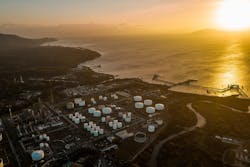Pilipinas Shell to temporarily halt Tabangao refinery operations
Royal Dutch Shell PLC subsidiary Pilipinas Shell Petroleum Corp. (Pilipinas Shell) will temporarily shutter its 110,000-b/d Tabangao refinery in Batangas City, Philippines, about 121 km south of Manila, as a cash-conservation measure during the ongoing period of reduced fuel demand as the country’s enhanced community quarantine to fight the spread of coronavirus (COVID-19) remains in place.
In response to the drastic decline in local product demand and major deterioration of regional refining margins brought about by the pandemic, Pilipinas Shell will shut down Tabangao refinery operations for about 1 month starting mid-May, the operator said in a May 5 filing to Philippine Stock Exchange Inc.
While Pilipinas Shell confirmed it will use the month to execute proactive maintenance activities at the refinery, the operator disclosed no further details regarding the proposed maintenance work.
During the shutdown period, Pilipinas Shell also will use the Tabangao refinery, as well as its North Mindanao Import Facility (NMIF) in Cagayan de Oro City, as product import terminals. Joint operation of the NMIF and refinery as import terminals will ensure supply of Shell fuels remains uninterrupted to Filipinos, the operator said.
Should market and demand conditions improve or stabilize during the planned shutdown period, however, Pilipinas Shell reassured it retains flexibility to restart refinery operations immediately.
Pilipinas Shell commissioned the NMIF, which has a 90 million-l. capacity, in July 2016, according to the operator’s website.
Tabangao update
In its yearend-2019 operations update to investors issued Apr. 1, Pilipinas Shell said it has started setting up an integrated hydrogen manufacturing plant at Tabangao to help increase the refinery’s flexibility to process a more-varied slate of crude oils into cleaner finished products. The proposed hydrogen plant comes as part of Pilipinas Shell’s growth optimization plans to ensure the refinery’s long-term competitiveness.
The operator also confirmed the refinery developed flexibility to produce low-sulfur fuel oil in December 2019 to help achieve compliance with the International Maritime Organization’s global cap of 0.5% sulfur on fuel oil that took effect Jan. 1, 2020.
About the Author
Robert Brelsford
Downstream Editor
Robert Brelsford joined Oil & Gas Journal in October 2013 as downstream technology editor after 8 years as a crude oil price and news reporter on spot crude transactions at the US Gulf Coast, West Coast, Canadian, and Latin American markets. He holds a BA (2000) in English from Rice University and an MS (2003) in education and social policy from Northwestern University.

